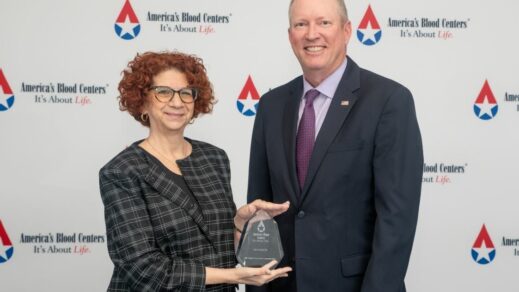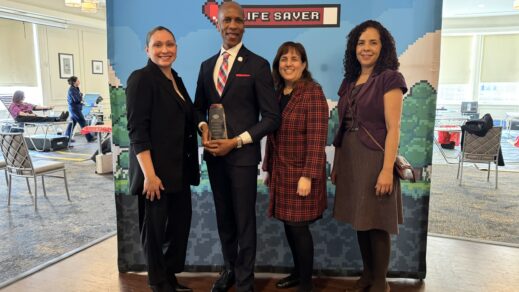Current Projects
Transfusion Immunology
Red blood cell (RBC) transfusions remain a very important modality of treatment for patients with hemoglobinopathies including sickle cell disease (SCD). Despite its benefits, RBC transfusion can result in the development of antibodies (alloimmunization) against transfused cells in patients with SCD and thalassemia. Alloantibodies can cause delayed hemolytic transfusion reactions which in SCD patients can trigger hyperhemolysis, a life-threatening poorly understood phenomena in which the transfused and the patient’s own RBCs are destroyed. In addition, finding compatible units for patients with alloantibodies can be difficult and identifying and characterizing the antibodies can be costly, time-consuming and laborious, causing transfusion delays. This highlights the need for better characterization of triggers of alloimmunization and identification of risk factors.
We are studying cellular immune responses to transfused blood products with the goal of developing strategies to prevent immune-mediated transfusion reactions. Current research focus is on characterizing immunoregulatory networks, including defective regulatory T and B cell pathways that result in alloimmunization. In addition, we have identified a novel subset of follicular T cells (Tfh) critical in providing help to B cells for the generation of antibody responses. The activity of this Tfh subset, which expresses the checkpoint inhibitor molecule TIGIT, differs in patients with and without alloantibodies. We are currently examining how abnormal TIGIT signaling may lead to alloimmunization with the goal that this information may help toward future identification of biomarkers of alloimmunization and therapeutic strategies for its prevention.
Immunological response to hemolysis
Patients with hemolytic anemias including patients with SCD suffer from ongoing intravascular hemolysis, which results in the release of free hemoglobin and heme into the circulation, causing activation of the underlying vasculature. We have identified aberrant immune response to free heme inalloimmunized patients with SCD and we are currently investigating immunological response to hemolysis in the setting of transfusions focusing on HO-1 and TLR-4 mediated pathways that can be manipulated to prevent and even reverse alloimmunization. Furthermore, painful vaso-occlusive crisis (VOC), a clinical hallmark of SCD, resulting from obstruction of vasculature by sickle RBCs is associated with microvascular damage. Currently, the molecular mechanisms resulting in VOC remain incompletely understood. We have identified a novel function of patrolling monocytes in the removal of hemolysis-injured endothelial cells in the SCD vasculature and in lowering VOC risk. Current studies are focused on understanding the molecular machinery involved in the vasculoprotective role of patrolling monocytes and the therapeutic potential of manipulating this subset in SCD.
Platelet autoimmunity
We are characterizing the cellular and molecular pathways resulting in platelet autoimmunity in patients with immune thrombocytopenia (ITP) with the goal of developing new and improved treatments. To date, our studies have unraveled quantitative and functional differences in monocytes and their control of T effector functions with possible involvement of ITP platelets in driving autoimmunity. Current research focus is on identifying immunological signatures of ITP drug response.
Funding Support
- NIH P01 HL149626 Yazdanbakhsh (PD) 07/20/2020 – 06/30/2025 “Complications of Hemolysis and Transfusion Therapy”
- NIH R35 HL161239 Yazdanbakhsh (PI) 03/2022 – 12/2028 “Immune Pathophysiology of Sickle Cell Disease”
Education and Training
Doctoral Training
PhD, Molecular Biology, National Institute for Medical Research (MRC), Mill Hill, London, UK
Postdoctoral Training
Columbia University, Rockefeller University
Karina Yazdanbakhsh, PhD, Researcher Profile PDF
Publications
Tang A, Strat AN, Rahman M, Zhang H, Bao W, Liu Y, Shi D, An X, Manwani D, Shi P, Yazdanbakhsh K, Mendelson A. Murine bone marrow mesenchymal stromal cells have reduced hematopoietic maintenance ability in sickle cell disease. Blood. 2021 Dec 16;138(24):2570-2582.
Liu Y, Pal M, Bao W, Shi PA, Lobo CA, An X, Manwani D, Zhong H and Yazdanbakhsh K. Type I interferon is induced by hemolysis and drives antibody-mediated erythrophagocytosis in sickle cell disease. Blood 2021 Sep 30;138(13):1162-1171
Pal M, Bao W, Wang R, Liu Y, An X, Mitchell WB, Lobo CA, Minniti C, Shi PA, Manwani D, Yazdanbakhsh K, Zhong H. Hemolysis inhibits humoral B-cell responses and modulates alloimmunization risk in patients with sickle cell disease. Blood. 2021 Jan 14;137(2):269-280.
Mendelson A, Strat AN, Bao W, Rosston P, Fallon G, Ohrn S, Zhong H, Lobo C, An X, Yazdanbakhsh K. Mesenchymal stromal cells lower platelet activation and assist in platelet formation in vitro. JCI Insight. 2019 Aug 22;4(16).
Yi W, Bao W, Rodriguez M, Liu Y, Singh M, Ramlall V, Cursino-Santos JR, Zhong H, Elton CM, Wright GJ, Mendelson A, An X, Lobo CA, Yazdanbakhsh K. Robust adaptive immune response against Babesia microti infection marked by low parasitemia in a murine model of sickle cell disease. Blood Adv. 2018 Dec 11;2(23):3462-3478.
Pirenne F, Yazdanbakhsh K. How I safely transfuse patients with sickle-cell disease and manage delayed hemolytic transfusion reactions. Blood 2018 Jun 21;131(25):2773-2781.
Liu Y, Jing F, Yi F, Mendelson A, Shi P, Walsh R, Friedman DF, Minniti C, Manwani D, Chou ST, and Yazdanbakhsh K. HO-1hi Patrolling Monocytes Protect against Vaso-occlusion in Sickle Cell Disease. Blood 2018, Apr 5;131(14):1600-1610.
Godefroy E, Liu Y, Shi P, Mitchell WB, Cohen D, Chou ST, Manwani D, Yazdanbakhsh K. Altered heme-mediated modulation of dendritic cell function in sickle cell alloimmunization. Haematologica. 2016, Sep;101(9):1028-38.
Godefroy E, Zhong H, Pham P, Friedman D, Yazdanbakhsh K. TIGIT+ Circulating Follicular Helper T cells Display Robust B cell Help Functions: Potential Role in Sickle Cell Alloimmunization. Haematologica. 2015, Nov;100(11):1415-25.
Liu Y, Zhong H, Bao W, Mendelson A, An X, Shi P, Chou ST, Manwani D, Yazdanbakhsh K. Patrolling monocytes scavenge endothelial-adherent sickle RBCs: a novel mechanism of inhibition of vaso-occlusion in SCD. Blood. 2019 Aug 15;134(7):579-590.
Zhong H, Bussel J and Yazdanbakhsh K. In vitro TNF blockade Enhances Ex Vivo Expansion of Regulatory T cells in Patients with Immune Thrombocytopenia. Br J Haematol. 2015;168(2):274-
Zhong H, Bao, and Yazdanbakhsh K.Immunologic characterization suggests reduced alloimmunization in a murine model of thalassemia intermedia. Transfusion, 2014 Nov;54(11):2880-91.
Zhong H, Bao, W, Freidman, D and Yazdanbakhsh K.Hemin controls T cell polarization in sickle cell alloimmunization. J Immunol. 2014 Jul 1;193(1):102-10.
Zhong H, and Yazdanbakhsh K. Differential control of Helios+/- Treg development by monocyte subsets through disparate inflammatory cytokines. Blood. 2013 Mar 28;121(13):2494-502.
Li X, Zhong H, Bao W, Boulad N, Evangelista J, Haider MA, Bussel J, and Yazdanbakhsh K. Defective regulatory B cell compartment in patients with immune thrombocytopenia. Blood, 2012 120(16):3318-25.
Yazdanbakhsh K., Ware, R and Noizat-Pirenne, F. Red blood cell alloimmunization in sickle cell disease: pathophysiology, risk factors, and transfusion management. Blood. 2012;120(3):528-37.
Zhong H, Bao W, Li X, Miller, A, Seery, C, Haq, N, Bussel J, and Yazdanbakhsh K. CD16+ Monocytes Control T cell Subset Development in Immune Thrombocytopenia. Blood, 2012 120(16):3326-35.
Bao W, Zhong H, Li X, Lee MT, Schwartz J, Sheth S, Yazdanbakhsh K. Immune regulation in chronically transfused allo-antibody responder and nonresponder patients with sickle cell disease and β- thalassemia major. Am J Hematol. 2011 Dec;86(12):1001-6
Bao W, Bussel JB, Heck S, He W, Karpoff M, Boulad N, Yazdanbakhsh K. Improved regulatory T cell activity in patients with chronic immune thrombocytopenia treated with thrombopoietic agents. Blood, 2010 116(22):4639-45.
Bao W, Yu J, Heck S, Yazdanbakhsh K. Regulatory T cell status in red cell alloimmunized responder and non-responder mice. Blood 2009 113: 5624-5627.
Yu J, Heck S, Patel V, Levan J, Yu Y, Bussel JB, Yazdanbakhsh K. Defective circulating CD25 regulatory T cells in patients with chronic immune thrombocytopenic purpura. Blood 2008;112(4):1325-8.
Mqadmi, A., Zheng, X., and Yazdanbakhsh, K. CD4+CD25+ regulatory T cells control induction of autoimmune hemolytic anemia. Blood, 2005, 105(9):3746-8
Yazdanbakhsh, K., Kang S., Tamasauskas, D., Sung D., and Scaradavou, A. Complement receptor 1 inhibitors for prevention of immune-mediated red cell destruction: potential for transfusion therapy. Blood. 2003;101(12):5046-52.
Tamasauskas, D., Powell, V., Saksela, K., and Yazdanbakhsh, K. A Homologous naturally-occurring mutation in Duffy and CCR5 leading to reduced receptor expression. Blood. 2001. 97 (11), 3651-3654.
Yazdanbakhsh, K., Choi, J.W., Li, Y., Lau, L.F. and Choi, Y. Cyclosporin A blocks apoptosis by inhibiting the DNA binding activity of the transcription factor 77. Natl. Acad. Sci. USA 1995; 92: 437-441.
Yazdanbakhsh, K., Lee, S., Yu, Q., and Reid, M.E. Identification of a defect in the intracellular trafficking of a Kell blood group variant. Blood, 1999; 94; 310-318.
Yazdanbakhsh, K., Park, C.G., Winslow, G.M. and Choi, Y. Direct evidence for the role of COOH terminus of mouse mammary tumor virus superantigen in determining T cell receptor V specificity. J. Exp. Med. 1993; 178: 737-741.
Full List of Publications


